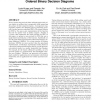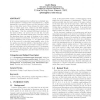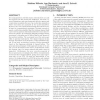164 search results - page 29 / 33 » Covert two-party computation |
ASIACRYPT
2004
Springer
14 years 4 months ago
2004
Springer
Secret handshakes were recently introduced [BDS+ 03] to allow members of the same group to authenticate each other secretly, in the sense that someone who is not a group member ca...
CCS
2006
ACM
14 years 2 months ago
2006
ACM
Privacy-preserving protocols allow multiple parties with private inputs to perform joint computation while preserving the privacy of their respective inputs. An important cryptogr...
TIFS
2010
13 years 9 months ago
2010
A fair contract signing protocol allows two potentially mistrusted parities to exchange their commitments (i.e., digital signatures) to an agreed contract over the Internet in a f...
WISEC
2010
ACM
14 years 3 months ago
2010
ACM
Key management in wireless sensor networks does not only face typical, but also several new challenges. The scale, resource limitations, and new threats such as node capture and c...
SIGECOM
2009
ACM
14 years 5 months ago
2009
ACM
We study protocols to enable one user (the principal) to make potentially profitable but risky interactions with another user (the agent), in the absence of direct trust between ...



